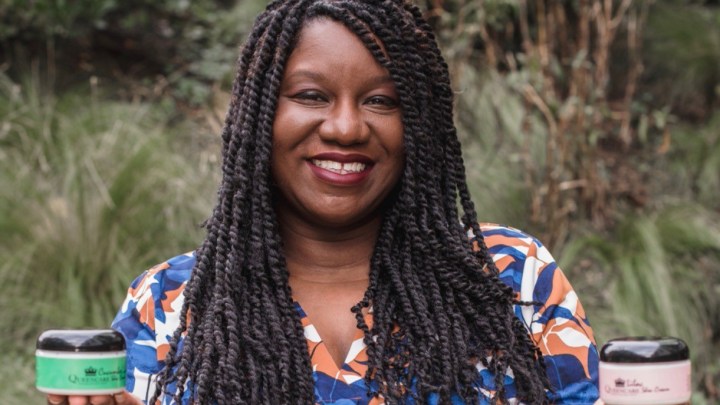
Helping students of color thrive via entrepreneurship and self-care
Helping students of color thrive via entrepreneurship and self-care

Monika Mathews owns QueenCare, a luxury body care line and shop in Seattle. When the pandemic hit, she realized she had to make a few changes in her business based on the needs of her community and the demand.
“We had to make a decision to just stop producing our body washes and brown-sugar scrubs,” Mathews said.
In normal times, these products were important to her business and her self-care brand. Instead, she decided to shift to producing and selling only sanitizers and hand soaps.
“That business decision alone actually saved our business,” she said.
QueenCare is more than a brick-and-mortar business. It is a training ground for aspiring entrepreneurs. Back in 2003, Mathews founded the Life Enrichment Group, a nonprofit organization that offers mentorship programs to local students of color, including entrepreneurship and business skills training.
“QueenCare really was created to fund our nonprofit good because we knew we could not just depend on grants and the benevolence of others to fund what we feel is proper community development,” Mathews said.
“Marketplace” host Kai Ryssdal spoke with Mathews about what it means to build up a community through a microbusiness during this time. The following is an edited transcript of their conversation.
Kai Ryssdal: Talk to me about your community. As you saw your business struggling these first number of months of the pandemic, I imagine it was critical for you to get out into the community and as much as you could virtually, sort of to look for support there.
Monika Mathews: Yes, it was very hard in the beginning months of the pandemic, and it still is. We’re not in the clear. We had to be open to change. There were lessons, hard lessons, that we had to learn fast. We didn’t have the luxury of time on our side. And so, with everyone being, you know, at home and working from home, we had to pivot to online. And that was a big learning curve. We weren’t as tech-savvy to really promote the website or to be on social media and those things. And those were things that we had to start doing. We had to figure it out and teach ourselves how to get ourselves out there virtually.
Ryssdal: How’s your stress level, though, as a woman running a microbusiness in an economy where the conversation is in trillions of dollars of economic relief?
Mathews: My stress level is through the roof. Absolutely. But, I learned early that I have to put myself first. I have to have proper rest, I have to do the things that help keep me grounded so that I can make good business decisions.

Ryssdal: Yeah. Do you feel seen in all of this?
Mathews: Can you clarify that question?
Ryssdal: Yeah, I will. Do you feel seen as a Black entrepreneur, running a business, grounded in the Black community, in this moment, in this economy, after George Floyd and Black Lives Matter? When, as I said a minute ago, the aid that’s being talked about is in the trillions of dollars going to big companies, where, frankly, they might not see you?
Mathews: Yeah, there are times where I don’t feel seen. And then there are times where I feel seen. So, on a whole, I feel like since the murder of George Floyd, there has been more spotlight, if you will, on Black businesses and more interest in the Black experience. And so, from that standpoint, yes, I do feel seen. As far as the aid is concerned and the financial support, I would have to say, no, not all the way. Even going through, like, the [Paycheck Protection Program] process, which I still have not received for QueenCare, I feel like that whole, entire process I was totally not seen. And you know, I’m not going to say it was because of race, I’m going to definitely say it was because of economics, because my application just sat and sat and sat at the bank while the bank was replenished funds three cycles! You know, and I have to say, I think it was definitely because I was a small business, that my receipts weren’t big enough. But just because of that did not mean that, you know, my application should not have been processed.
Ryssdal: So, as we look toward, fingers crossed, to the end of this thing, what are your prospects for QueenCare and for the Life Enrichment Group? I mean, do you expect growth and you know, bigger things?
Mathews: I expect growth. This is really legacy work, this is not about me, this is about we. This is about community development and really boosting those in our community that may not have had the opportunities prior. And the fact that we are developing youth and providing internships for them. People want their young people to thrive, and they are our next generation. I want to leave something that our children’s children can build upon.
There’s a lot happening in the world. Through it all, Marketplace is here for you.
You rely on Marketplace to break down the world’s events and tell you how it affects you in a fact-based, approachable way. We rely on your financial support to keep making that possible.
Your donation today powers the independent journalism that you rely on. For just $5/month, you can help sustain Marketplace so we can keep reporting on the things that matter to you.












